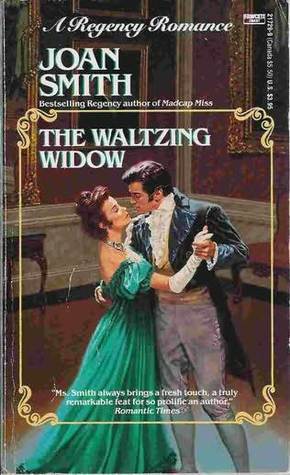Waltzing Widow by Joan Smith (1991)
 My second Joan Smith on the trot and I’m finding that my palate soon becomes jaded. They are very samey, and for those looking solely for the froth of a light-hearted Heyer-esque romp, this is just the ticket, but after a while I begin to long for a bit of character development. In this one, the misunderstandings all became a bit too tangled and I just wanted it all to stop.
My second Joan Smith on the trot and I’m finding that my palate soon becomes jaded. They are very samey, and for those looking solely for the froth of a light-hearted Heyer-esque romp, this is just the ticket, but after a while I begin to long for a bit of character development. In this one, the misunderstandings all became a bit too tangled and I just wanted it all to stop.
Here’s the premise: Lucy Percy was almost taken in by a fortune hunter during the season in London. To allow herself time to recover, she and her aunt rent a cottage in the countryside. To deter unwanted suitors, Lucy pretends to be married and her widowed aunt pretends to be a spinster, and of course this is going to lead to huge problems. It so happens that the cottage is owned by a baron, Lord Bigelow, who decides that Lucy is just his sort of lady – what a pity she’s married. She instantly decides that being married is a hindrance to her ultimate objective, which is to find a husband of the non-fortune-hunting variety, so she summarily bumps off her supposed husband and makes herself a widow. Lord Bigelow is thrilled, and thinks it’s just a misunderstanding that he thought her husband was alive.
Meanwhile, Lord Bigelow’s uncle, the Earl of Avedon, is much more suspicious, and thinks Lucy is herself a fortune hunter. He’s a bit confused, because both she and the aunt are clearly well-bred, but he’s quite sure she’s a retired courtesan or actress, out to snabble a rich husband. He sets out on a campaign to get rid of Lucy and her aunt by forcing them out of the cottage. Being the principal landowner in the district, he decides to do some road ‘improvements’ around their cottage, effectively cutting them off from food supplies and company. Lucy isn’t about to surrender so tamely, however, so she and her aunt ingeniously work around the problem (and frankly, it’s hard to see how digging up the road would stop the butcher’s boy, say, from walking over the fields to deliver their leg of lamb; everybody walked everywhere in those days).
And so it goes on, the two of them fighting tooth and nail, she always having the upper hand and he, the prim and proper gentleman, finally unravelling in spectacular style. As always with Joan Smith, the romance takes a back seat to all the banter and shenanigans, and there isn’t even a particularly romantic denouement at the end. And as I mentioned before, the whole thing became tediously complicated. I eventually gave up trying to work out who knew what, and whether it was true or not. It was just too much work. Lots of fun between the complications, though, and although it wasn’t altogether to my taste, I enjoyed it well enough for four stars.



